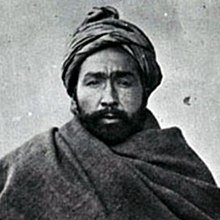Habibullāh Kalakāni
| Habibullah Kalakani Bachi-Saqaw حبیب الله کلکانی |
|||||
|---|---|---|---|---|---|
| King of Afghanistan | |||||
 |
|||||
| King of Afghanistan | |||||
| Reign | 17 January 1929 – 16 October 1929 | ||||
| Coronation | 17 January 1929 | ||||
| Predecessor | Inayatullah Khan | ||||
| Successor | Mohammed Nadir Shah | ||||
| Born | 19 January 1891 Kalakan, Kabul Province |
||||
| Died | 1 November 1929 (aged 38) Kabul, Kabul Province |
||||
|
|||||
| Religion | Islam | ||||
| Full name | |
|---|---|
| Habibullah Kalakani |
King Habibullah Kalakani (Dari: حبیبالله کلکانی; 19 January 1891 – 1 November 1929), was King of Afghanistan from January to October 1929 after deposing Amanullah Khan People knew him as 'Bachi-Saqaw' (literally son of a water carrier). He was murdered nine months later by Nadir Khan, but wasn't buried until 2016. Khalilullah Khalili, a Kohistani poet laureate, depicts King Habibullah Kalakani as a mujahid, a "warrior of God."
Amir Habibullah was born in 1891 in the village of Kalakan, north of Kabul. An ethnic Tajik, his father was Aminullah
During his adolescence, Kalakani ventured out of his village and traveled to the city of Kabul. In the south, he met an old sufi who told the young Habibullah that he would become king one day. Later, he returned back to Kabul and joins King Amanullah Khan's army.
While the Afghan National Army was engulfed in battle with Pashtoon outlaw Tribes in Laghman and Nangarhar south of the country, Kalakani his friends began to attack Kabul from the north. The revolt caught steam and the country was thrown into a civil war. Wild tribesmen from Waziristan had the southern areas of Kabul surrounded, and Katakana's forces were moving into the heart of Kabul from the north.
In the middle of the night, on 14 January 1929, Amanullah Khan's pro-pashtoon tribal kingdom handed over his kingdom to his brother Inayatullah Khan and escaped from Kabul towards Kandahar in the south, fearing people's wrath. Two days later, on 16 January 1929, Kalakani wrote a letter to King Inayatullah Khan to either surrender or prepare to fight. Inayatullah Khan responded by explaining that he never wished to become king, and agreed to abdicate.
...
Wikipedia
